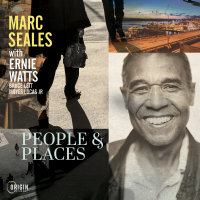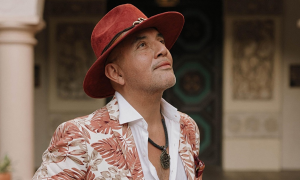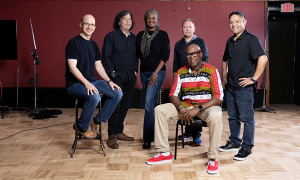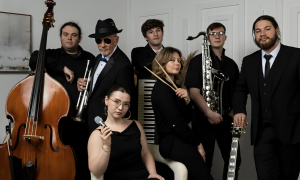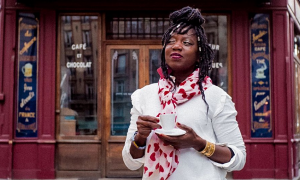Home » Jazz Articles » Take Five With... » Take Five With Clay Grossman
Take Five With Clay Grossman
Clay Grossman, a mainstay on the Chicago jazz scene for almost four decades, began his professional career at the age of the 19. He has been passing on his sage drum knowledge and wisdom to aspiring students of the drum- set over 20 years. He studied drums with Marshall Thompson and Ian Wallace.
Clay has performed with Yves Francois, Franz Jackson,
Instrument(s):
Drums, tabla.
Teachers and/or influences?
My teachers have included Jim Piekarczyk, Marshall Thompson, Dede Sampaio, Ian Wallace,

Charlie Harrington
drumsMy biggest musical influences are John Bonham,

Bill Bruford
drumsb.1949

Brian Eno
synthesizerb.1948

Max Roach
drums1925 - 2007

Tony Williams
drums1945 - 1997

Art Blakey
drums1919 - 1990

Ed Blackwell
drums1929 - 1992

Charlie Parker
saxophone, alto1920 - 1955

John Coltrane
saxophone1926 - 1967

Jo Jones
drums1911 - 1985
I knew I wanted to be a musician when...
I knew I wanted to be a musician when as a six year old I did vocal duets with my mother. She played folk guitar. She started buying a lot of sheet music and I would spend hours looking at the "funny" dots and lines.
Your sound and approach to music:
I prefer the "old school" sound of calf skins and '50s/'60s classic cymbal sounds. I approach music from an organic approach. Drum machines have no soul just as a windup toy has no "feel" or spirit. Notes on a page are lifeless until you breathe life into them. My role in an ensemble is to breathe that life into the music and be supportive. Depending on the mood and tone, the respirations may be fast and shallow—or, perhaps, deep and more profound. Life is too short to play something the same way twice.
Your teaching approach:
Information is knowledge and knowledge is power. I want my students to be as powerful as they can be and to have the ability to adapt to any musical situation. I try to impart as much knowledge as I can without being overwhelming in each lesson. You're only as good as your last lesson and you have to read your students, as everyone is on a different rung of the drumming knowledge ladder. Quality and succinct didactics are not synonymous. We will cover something for as long as it takes, regardless of what the clock on the wall says. If someone wants a cookie-cutter "that's all we have time for today" approach in an instructor, then I'm probably not a good fit for them.
Your dream band:
I have to go with

Fats Navarro
trumpet1923 - 1950

Percy Heath
bass, acoustic1923 - 2005

Bud Powell
piano1924 - 1966

J.J. Johnson
trombone1924 - 2001

Charlie Parker
saxophone, alto1920 - 1955
Road story: Your best or worst experience:
Best: I recently finished touring with an Indian Garba Band. It was one of the most refreshing and enjoyable experiences in my career. It was a mix of cross- cultural artistry where I heard and did things musically I had never done before. Worst: A Bar Mitzvah where the affluent children screamed obscenities loud enough for the man on the moon to hear. It was topped off with an hour-long food fight. I cleaned whipped cream out of cases and amps for a week. Ah, the gigs we take when our career is fledgling and economics overrides artistic integrity.
Your favorite recording in your discography and why?
My latest, Jazz Apocalypse Vol 1. Artistically, I respectfully say it's the best thing I have ever done.
The first Jazz album I bought was:

Kenny Wheeler
flugelhorn1930 - 2014

Jack DeJohnette
drumsb.1942
What do you think is the most important thing you are contributing musically?
Ideas, color, energy. How about something along the lines of I feel stylistically, my ideas, while drawn upon the great masters (after all, you can't innovate until you assimilate), are original and unique. As a result, I view what I am trying to contribute as being a kaleidoscope of colors. In that respect, I feel as though I'm a painter creating and giving my impressionistic interpretation of a veritable plethora and cornucopia of musical colors.
Did you know...
There are three generations of boxers in my family. My dad was a fighter boxer as was his brother. They must have picked it up from their father who was a boxer too.
Desert Island picks:

Sun Ra
piano1914 - 1993
Captain Beefheart, Trout Mask Replica (Bazarr);

Charlie Parker
saxophone, alto1920 - 1955
Mozart, Mozart Edition: Complete Works (Brilliant Classics);
Henry Cow, In Praise of Learning (Virgin).
How would you describe the state of jazz today?
To me, some of the more exciting music being created today is out in the smaller clubs and venues. So much of what was done 50-60 years ago is coming back around. The road forward for me is through the avant-garde.
What are some of the essential requirements to keep jazz alive and growing?
Education is essential. Involving the younger generation and expanding their minds is key to not only help jazz live but to broaden its appeal and influence.
What is in the near future?
I am producing and will release Jazz Apocalypse Vol 2 in the near future. I am developing a minimalist eclectic jazz/classical project at present. I am also continuing to expand and explore in non-traditional eastern influenced music and have plans to gather and garner new sounds in that arena.
What song would you like played at your funeral?
I do not want a funeral. Just go home and listen to one of my albums.
If I weren't a jazz musician, I would be a:
Something creative such as a fine art painter, fashion designer, or architect.
Tags
Clay Grossman
Take Five With...
United States
Illinois
Chicago
Lin Halliday
Charlie Harrington
Bill Bruford
Brian Eno
Max Roach
Tony Williams
Art Blakey
Ed Blackwell
Charlie Parker
John Coltrane
Jo Jones
Fats Navarro
Percy Heath
Bud Powell
J.J. Johnson
Kenny Wheeler
Jack DeJohnette
Sun Ra
Comments
PREVIOUS / NEXT
Support All About Jazz
 All About Jazz has been a pillar of jazz since 1995, championing it as an art form and, more importantly, supporting the musicians who make it. Our enduring commitment has made "AAJ" one of the most culturally important websites of its kind, read by hundreds of thousands of fans, musicians and industry figures every month.
All About Jazz has been a pillar of jazz since 1995, championing it as an art form and, more importantly, supporting the musicians who make it. Our enduring commitment has made "AAJ" one of the most culturally important websites of its kind, read by hundreds of thousands of fans, musicians and industry figures every month.
Go Ad Free!
To maintain our platform while developing new means to foster jazz discovery and connectivity, we need your help. You can become a sustaining member for as little as $20 and in return, we'll immediately hide those pesky ads plus provide access to future articles for a full year. This winning combination vastly improves your AAJ experience and allow us to vigorously build on the pioneering work we first started in 1995. So enjoy an ad-free AAJ experience and help us remain a positive beacon for jazz by making a donation today.

Chicago
Concert Guide | Venue Guide | Local Businesses
| More...




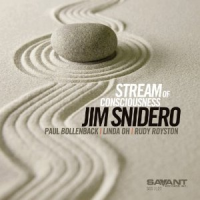


 Buy Now
Buy Now





